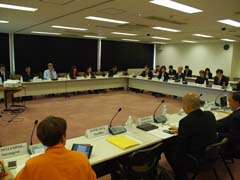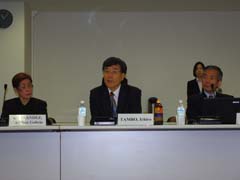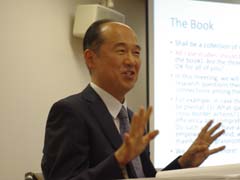New Research Explores Concrete Ways to Tackle Threats to Human Security in East Asia
2015.05.11
Prominent scholars participating in the research project "Human Security in Practice: East Asian Experiences" gathered for a workshop April 17-18, 2015 at the JICA Research Institute in Tokyo, kicking off the second phase of the project.
In the first phase of the project, researchers surveyed and analyzed people's perceptions about the concept of human security and identified problems they see as threats to human security in the 10 member countries of the Association of Southeast Asian Nations (ASEAN), along with China, Japan and South Korea. Collectively, these countries are known as ASEAN Plus Three.
The research results in seven ASEAN member countries, along with China and South Korea, were recently published as nine working papers respectively. Four more papers on the other three ASEAN countries and Japan will also be published this year. Based on the findings of the first phase, the second phase of the project has now been launched. The research outcome of the second phase is to be published in the form of an academic book in 2016.

Scholars discussed
the research framework

JICA-RI Director
Ichiro Tambo, center
At the workshop, participants discussed the research framework and how to move forward with the case studies in the research.
The concept of human security is defined as "securing fundamental freedoms for everyone (freedom from fear, freedom from want, and freedom to live in dignity) by combining top-down protection and bottom-up empowerment.*" The concept has spread slowly but steadily since its introduction in the United Nations Development Progamme's Human Development Report 1994, but how to operationalize it on the ground remains a challenge both in research and practice.
With the goal of finding existing good practices and promoting further operationalization of human security in East Asia, JICA-RI kicked off the project in 2013 in cooperation with the Institute for Strategic and Development Studies (ISDS), a member of the ASEAN Institutes of Strategic and International Studies (ASEAN-ISIS), and researchers from universities in China, Japan and South Korea.
JICA-RI Director Ichiro Tambo said in his opening remarks at the workshop that achieving human security requires transcending borders so regional cooperation within the ASEAN Plus Three framework is important.
In session 1, chaired by Professor Ren Xiao of Fudan University, one of the four editors of the academic book to be released in the second phase, the other three editors gave presentations.

Yoichi Mine,
JICA-RI visiting fellow
Yoichi Mine, JICA-RI visiting fellow and professor of Doshisha University, explained the project background and outlined the entire project.
Carolina G. Hernandez, founding president of ISDS and emeritus professor of University of the Philippines-Diliman, showed research findings obtained in the first phase and Eun Mee Kim, dean and professor of Ewha Womens University, explained the research framework of the second phase.
In session 2, workshop participants discussed how to conduct individual case studies based on presentations by the respective chapter authors.
The participants shared a common understanding that the research aimed to identify the best practices of human security by examining how policies are applied on the ground. Using a case study approach, the research will examine 10 different situations where cross-border responses to human insecurities, including natural disasters, infectious diseases, violent conflict and human trafficking, were or have been made.
Each case study is to address the following three common research questions with a relative focus on one or two of them: how to deal with threats and/or actions that go beyond borders, how to provide comprehensive support rather than giving aid in piecemeal ways and how to promote bottom-up empowerment in addition to top-down protection.
Asked his thoughts on the project and future expectations, Mine said, "I sincerely hope to work together to produce a beautiful 'Asian' tapestry of human security, knitting with diverse colors of yarn. People look at the same thing from different angles, but this plain fact must be a source of power rather than confusion. It is reassuring that a common understanding of human security is emerging in the regional framework."
The nine papers from the first phase are available at the following websites.
*Kamidohzono, Sachiko G., Oscar A. Gomez and Yoichi Mine. 2015. Embracing Human Security: New Directions of Japan's ODA for the 21st Century, JICA-RI Working Paper No. 94..

事業事前評価表(地球規模課題対応国際科学技術協力(SATREPS)).国際協力機構 地球環境部 . 防災第一チーム. 1.案件名.国 名: フィリピン共和国.

事業事前評価表(地球規模課題対応国際科学技術協力(SATREPS)).国際協力機構 地球環境部 . 防災第一チーム. 1.案件名.国 名: フィリピン共和国.

事業事前評価表(地球規模課題対応国際科学技術協力(SATREPS)).国際協力機構 地球環境部 . 防災第一チーム. 1.案件名.国 名: フィリピン共和国.

事業事前評価表(地球規模課題対応国際科学技術協力(SATREPS)).国際協力機構 地球環境部 . 防災第一チーム. 1.案件名.国 名: フィリピン共和国.

事業事前評価表(地球規模課題対応国際科学技術協力(SATREPS)).国際協力機構 地球環境部 . 防災第一チーム. 1.案件名.国 名: フィリピン共和国.
scroll